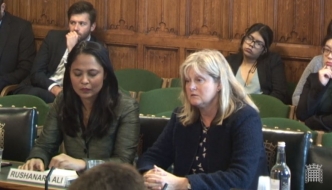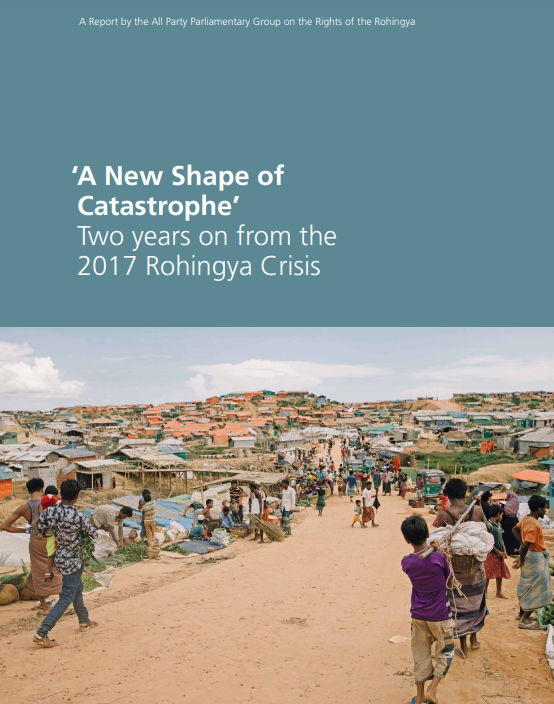Garment workers in Bangladesh
Anne Main MP and Rushanara Ali MP co-wrote the below article after the recent reports of violent clashes between garment factory workers and police forces in Bangladesh. The MPs, as leading members of the cross-party group on Bangladesh in Parliament, wanted to raise the many issues garment factory workers face and call on those companies and celebrities that benefit from the low wages paid to Bangladeshi garment workers to do more to help and raise awareness.
Garment trade article – Anne Main and Rushanara Ali
In just a few months’ time, we will be six years on from the Rana Plaza disaster in Bangladesh. The collapse of that factory, which killed over 1,100 people, shone a light across the world on the conditions endured by the people of Bangladesh who make the clothes we buy on our high streets across the Western world.
Major UK brands, such as Monsoon and Primark, sourced some of their clothing from the factory. The media focus following Rana Plaza unearthed various issues affecting governance in Bangladesh that led to the tragedy. Corruption, building regulation fraud, violence and intimidation of staff, unsafe working conditions, desperately low pay and little to no labour law protections - all contributed to the deaths back in 2013.
Soon after the collapse, workers across the country downed their tools and demanded improvements on labour safety, conditions and pay. They were successful, in no small part, due to international media attention on the country at the time.
The garment industry is one of Bangladesh’s biggest successes, and makes up over 85% of their global exports. It is a major driving force of the country’s economy, by providing millions of jobs.
Considerable progress has been made, with Bangladesh now home to many ethical clothing brands such as People Tree and Apolis. Some of the most advanced factories in Bangladesh now provide accommodation, support, training, access to childcare and other subsidies. However, there are still concerns about other factories in the country, especially those that are not covered by the Accord and Alliance that guarantees fire and building safety protection and workers’ rights.
Of the estimated 8,000 factories only around 3,000 are covered by the enhanced regulations. This leaves 5,000 that usually make either counterfeit garments or those not intended for sale in the West, with extremely weak worker protection and safety standards. Some of them are only inspected by the Bangladeshi government, and many of them aren’t inspected at all.
We visited the country, shortly after Rana Plaza as part of the All Party Parliamentary group for Bangladesh. During our visit, we managed to look inside some of these factories that are rarely seen by western investigators. The conditions were truly unimaginable. Staff cramped into appalling and hot conditions. Many suffering injuries or having to cope with major neck and back pain and little hope of a brighter future.
The Spice Girls, of all people, have been embroiled in the recent horror stories of brutality and abuse suffered by protesting workers in the factories over continued poor pay and conditions. The world-famous girl band had been promoting the sale of a t-shirt for Comic Relief with the message #IWANNABEASPICEGIRL. A line used to promote ‘gender justice initiatives’ and to help ‘tackle women’s issues’ as part of this year’s Comic Relief campaign.
The campaign was shut-down after the Guardian reported that young women in Bangladesh were being paid 35p per hour, working 16 hour days in hot, cramped and dangerous conditions to make the t-shirts.
Workers have recently taken to the streets in their thousands to once again protest against the appalling conditions they have to work in. Pay remains extremely low and conditions are reportedly deteriorating after time has passed since improvements after Rana Plaza.
The protests saw angry and violent clashes with police on the streets of Dhaka. There are widespread reports of police firing rubber bullets and tear gas at protestors too. Many employees who took part in the demonstrations did eventually return to work after the government increased wages, to find they had been dismissed from their jobs. A move clearly designed to spread fear and intimidation by factory bosses.
Bangladesh appears to be at an important cross-roads in its development, with wide-spread concern about the impartiality of their recent political elections, and the fact that opposition parties felt the election wasn’t fairly conducted. This is a country that has seen economic growth, coped with a major humanitarian crisis caused by the expulsion of a million Rohingya refugees, but is at a crossroads and the democratic dimension, or lack thereof, is something that is damaging its reputation.
Bangladesh has grown substantially in recent years, partly due to the four million who work in the garment industry. It will not become a developed economy overnight and wages will still take up to 50 years to match what we earn in the UK.
We cannot force wage rises on Bangladesh, it must come with growth and development, but we can do more to support them, to develop their industry into a more ethical one.
Many consumers in the UK are concerned that the products and garments they buy are not created ethically, and as such they may be indirectly sustaining cruel labour practices, human rights abuses and contributing to pollution problems.
This feeling is concurrent with the recent findings of a recent report by the UK Environmental Audit Committee, which is concerned that a large number of fashion retailers are failing to commit to reduce their environmental and social impact, there is scope for retailers to “do much more to tackle labour market and environmental sustainability issues.”
Consumers have the right to know the origin and story of the products they buy, so they can make an informed decision.
Some companies are already using technology to provide full tracking information to the consumer, so they’re able to trace the journey of their item to ensure it was made ethically.
The UK Government, and British retailers must work collaboratively with developing industries, to provide the necessary support to allow these advancements in technology and infrastructure to become the norm, and not a minority.
The UK should support, and apply pressure to the government of Bangladesh to ensure working conditions are made significantly safer. We can work to empower the vast majority of female staff to work reasonable hours in improved conditions. We can also support wage growth that gives employees a proper living wage that reflects the working hours and increasing profits made by factory owners.
Globally famous groups like the Spice Girls could make a real difference if they wanted to. They have the influence to spark real change in a developing country like Bangladesh. They could speak out and raise awareness amongst consumers in the UK and other western countries about the living and working conditions of factory workers there. Hopefully this will prompt change in how consumers think about the clothes they are buying.
We hope they step up to the plate and help to make a real difference.

DISSOLUTION OF PARLIAMENT
Watch: Anne Main, chair of the All Party Parliamentary Group on Bangladesh, talks about the Rohingya crisis and urges support for @DECappeal pic.twitter.com/FFL0lq8O0A
— DFID (@DFID_UK) October 12, 2017

